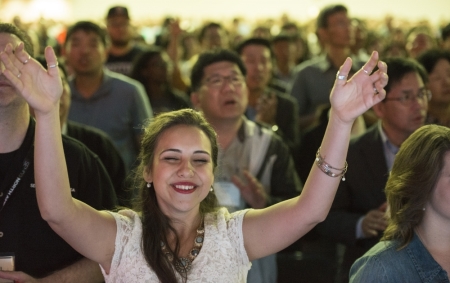Nondenominational vs. Southern Baptist: Is There a Difference?

Are there any significant differences between nondenominational and Southern Baptist churches?
A common joke among evangelicals is that nondenominational churches are for Southern Baptists who want to drink booze, suggesting there is not much difference between them.
But what does the data show?
In an article for Religion in Public titled "Nondenominational Protestants are Basically Southern Baptists (With a Few Caveats)" that was published Wednesday, Ryan P. Burge, a political science professor at Eastern Illinois University who specializes in religion and politics, analyzed data compiled by the Cooperative Congressional Election Study to compare the SBC, nondenominational churches, and the mainline United Methodist Church.
On issues like politics and worship attendance, SBC and nondenominational churches do bear a strong resemblance, but there are slight variations on how literal they take the Bible and how conservative they are on social issues.
"Nondenominational parishioners are slightly more supportive of same-sex marriage and slightly less supportive of abortion rights, but these differences are small," wrote Burge.
"Taken together it makes sense that there is so much movement between Southern Baptists and nondenominational churches as the differences are in many cases small or nonexistent."
Burge did note that nondenominational churches tended to be younger and more racially diverse than SBC churches. While both have about the same proportion of whites, nondenominational churches have a wider variety of non-whites, with larger percentages of Asians, Hispanics and mixed-race members. The non-white Southern Baptists are mostly black. (The UMC had, by far, the least racial diversity of the three denominations.)
SBC members were also more likely to believe the Bible is literally true than nondenominational members.
"While 44 percent of nondenominationals think that the Bible is literally true, 16 percent more of Southern Baptists espouse literalism, while about 16 percent less of United Methodists are theologically conservative," wrote Burge.
"This is an area which casts some doubts on the idea that nondenominationals are just Southern Baptists with a different label. Clearly, they have a more moderate theology than a typical SB evangelical."
The Southern Baptist Convention is the largest Protestant denomination in the country with over 15 million members. The SBC describes its churches as "cooperating" churches, emphasizing that each local church is "fully autonomous and retains its independence" and the denomination "claims no ecclesiastical authority over any local church."
Burge's research comes weeks after SBC International Mission Board President David Platt announced that he was stepping down to focus on his role as teaching Pastor at McLean Bible Church, a megachurch congregation based in Fairfax, Virginia.
"I have come to the realization that it is not viable long-term for me to lead as president of the IMB while serving as teaching pastor in a church," stated Platt in an announcement to IMB staff.
"This realization has been sobering, for I don't believe I can choose between preaching and leading in the local church, and mobilizing and shepherding people in global missions. Therefore, I have come to the conclusion that if I am going to serve in this way in the local church, then I need to serve in different ways for the cause of global missions."
Founded as a nondenominational church, McLean Bible has been in cooperation with the SBC since 2016, according to a spokesperson for IMB in comments given to The Christian Post last year.





















